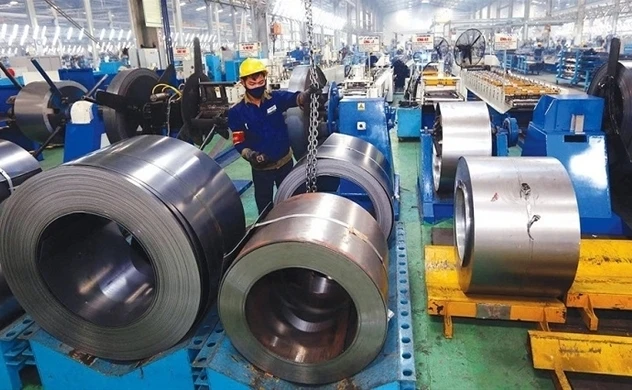
JOURNALIST: - Sir, what does the concretization of these new economic development policies mean?
Asso. Prof. Dr. TRAN DINH THIEN: - In the document of the 13th National Party Congress, there are many contents, but private economy is still the focus with many implications. The issue now is how to implement it. For a long time, we have only paid attention to developing enterprises in terms of quantity but have not paid much attention to quality, so the majority of Vietnamese enterprises are still very weak in the quality segment. When we talk about Vietnamese businesses, we only talk about state-owned enterprises as the mainstay, while private enterprises are discriminated as inferior.
In more than 30 years since renovation, private enterprises only account for 10% of GDP, while FDI enterprises account for 25%. Without private enterprises, a country has no motivation to grow. I hope that after the statements and guidelines given in the 13th National Party Congress will offer a complete strategy to develop Vietnamese enterprises in accordance with market principles.
- Sir, you once said that Vietnam needs strong private economic groups. Is this the time when we set the goal of building new industrial giants with the core being private enterprises, instead of state-owned enterprises as before?
- I think focusing on building and promoting the development of strong private economic groups is the right policy, but the problem is to having specific policies to do just that. Since we reformed and defined the multi-sector economy, the private economy has been recognized and has changed the economic landscape, bringing the economy out of a crisis. Unfortunately, then we abandoned it again. So promoting it right now should be with a much different strategy and focus. It was not until 2017 that private economy reiterated and began to rise. At the consulting group meeting, I told the Prime Minister that in 2020 we can fight against the Covid-19 pandemic very well because we have a foundation set three years ago, in which we focused on developing the private economy. The private economy is an important driving force.
However, at present, Vietnam has too few large private corporations, and less and less larger corporations are orienting to invest in production, mainly thanks to real estate and service businesses. Therefore, large private corporations have not yet been able to act as the main force, that can lead to competition, development and shape the economy. Therefore, in coming period, Vietnam should pay attention to large private groups with a clear determination of core values, because when there are no enterprises that are large private economic groups, enterprises will find it is very difficult for Vietnam to connect with each other to join the value chain. Large private enterprises play the role of shaping and leading production and value chains.
In fact, small Vietnamese enterprises cannot join the value chain at all, so product consumption is very difficult. For example, if we invite Samsung to invest, but domestic enterprises participating in the real production chain are very few, we can outsource only small, unimportant parts. Hence the current problem is the need to have large private enterprises as pillars. To become an economic powerhouse with aspirations to reach out, there must be strong private enterprises with sufficient credibility for global competitiveness.
- Sir, in the document of the 13th National Party Congress this time there is emphasis on innovation, which is being considered one of the driving forces for economic development in the new period. How do you evaluate this?
- This innovation is clearly identified by the Party. We have learnt this from experience of two previous times. The first time was in 1976, when we considered science and technology as the key. The second time was in 1990, when we focused on the development of knowledge economy. These two times we set it up but when we executed it, we got stuck and were unable to implement it, because of a binding mechanism. Now the mechanism is open, and along with integration, we have enough basis to get rid of lag. In order to innovate in technology, we require a strategy. This strategy is not confined to the framework of a sector, but we must be seen as the axis strategy of the entire digital economic development plan by playing a leading and cross-cutting role.
Recently, we researched and determined that the advantage of Vietnam's golden population will last for only about ten more years, so this is a valuable time for us to focus on promoting creativity, finding breakthroughs in economic development, and shortening the development with other countries, especially with other neighboring countries of Southeast Asia. Vietnam is also now open to deeper integration. The problem is how to strengthen the road to integration and create motivation in our people, instead of relying on outside forces to create necessary advantages to drive up our motivation to incorporate changes that will allow us to surge and develop.
-Thank you very much.




















